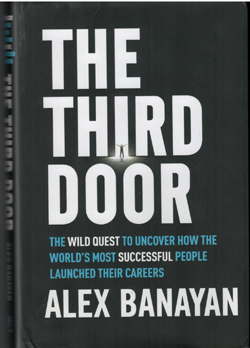The Third Door by Alex Banayan; © 2018 Crown Publishing Group of Penguin Random House LLC; ISBN 9780894-136662; 286 pages plus acknowledgments; $26.
By Donald H. Harrison

 SAN DIEGO – This is the story of a college student’s frenetic search for off-campus enlightenment in which he schemes and obsesses over interviewing the world’s most successful people about how they got their start and what advice they would give to young people just making their way into careers.
SAN DIEGO – This is the story of a college student’s frenetic search for off-campus enlightenment in which he schemes and obsesses over interviewing the world’s most successful people about how they got their start and what advice they would give to young people just making their way into careers.
Banayan, son of a Persian Jewish family of limited means who wanted nothing more than for him to become a doctor, had to figure out a way to finance his celebrity-chasing hobby, so he gulped down as many facts as he could about the television show The Price is Right, impressed the producers with his off-the-wall antics, and got to compete and win in the game emceed by Drew Carey. One of the prizes he won was a sailboat, which he promptly sold in order to have sufficient spending money.
There’s a difference between wanting something and knowing how to get it, so Banayan’s odyssey was very much a case of trial and error. He sneaked into a reception at USC for Steven Spielberg and almost got to hand his recently-printed business card to the movie producer’s assistant when a USC dean intervened, sternly telling him that he was breaking all the rules. Opportunity lost.
Banayan began to write email after email to successful business entrepreneurs, who one after another turned down his requests for interviews. His “holy grail,” so to speak, was Bill Gates, the founder of Microsoft and one of the world’s richest men. If only he could interview Gates, he was certain, other famous people like Warren Buffet, Bill Clinton, Oprah Winfrey, and Spielberg might be impressed enough to also grant him interviews. But, of course, getting to Gates, who receives multitudes of interview requests, would be no easy task. Banayan needed to find a way in.
This is a good point to explain the title of this book. Using the metaphor of a fancy nightclub, Banayan suggests that there is the front door where ordinary people line up, hoping to get in. Somewhere, perhaps around the corner, is another entrance where the VIPs enter the club, without hassle. If you are not a VIP, and you don’t want to wait in line with only a hope but no assurance that you’ll get in, then you have to find a third door. Perhaps, you come in through a grate in the cellar; or find access from an adjoining building; or espy an open window, but one way or another, on your own initiative, you find your way in. So, a search for other ways to meet the people he wanted to interview became Banayan’s modus operandi.
He did his homework, reading as many books and articles as he could about the people he wished to interview. He paid particular attention to their descriptions of how they jumped the line, and drew analogies to those experiences in his written appeals for interviews. Some celebrities saw in young Banayan an image of themselves and sympathetically came to his aid, offering not only advice but introductions. At one point, Banayan found himself jet-setting around Europe, living the life of the rich and famous, albeit on someone else’s dime.
Yes, he got to interview Bill Gates. No, he didn’t interview Clinton, Buffet, Winfrey, or Spielberg—at least not by the time this book went to press. However, he did have a chance to schmooze with other celebrities like boxing champion Sugar Ray Leonard, pop singer Lady Gaga, broadcaster Larry King, and Apple cofounder Steve Wozniak, among many others, gathering from each some pithy suggestions on how to distinguish yourself from the masses.
In writing this book, this memo of a half-crazed, sometimes hilarious, journey to business enlightenment, Banayan has made it through the third door. He now has entrée to a world that he only dreamed about back in the days when he was lying on the bed in his dorm room at USC. His quest overtook his college education, and he withdrew from his bachelor’s degree program. The question is, now what? How will quasi-celebrity benefit him, and more important, how will he benefit others?
*
Harrison is editor of San Diego Jewish World. He may be contacted via donald.harrison@sdjewishworld.com